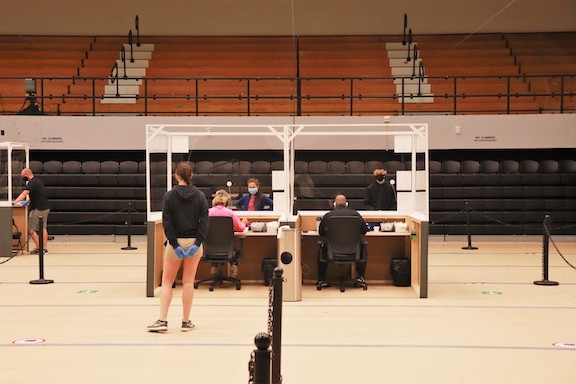College launches second semester of on-campus testing
February 12, 2021
 Caleb Adams-Hull
Caleb Adams-HullOver the weekend, the College welcomed back 1013 on-campus students and 64 students who are living off campus but have on-campus privileges. This meant the launch of Bowdoin’s second semester of coronavirus (COVID-19) testing protocols—this time with a significantly greater volume of tests to process each week.
Prior to arrival, students in the continental United States were mailed a self-administered COVID-19 test from distributor Let’s Get Checked in order to identify and limit the number of cases upon arrival. Students were instructed to return the tests by mail on January 29. According to COVID-19 Resource Coordinator Mike Ranen, 16 students tested positive through these tests, a number of whom had previous infections that were no longer contagious but were still detectable by the PCR test. Those with new infections worked with Health Services to determine an appropriate time to return to campus.
On February 5 and 6, students arrived to campus at previously scheduled times. Immediately, they were administered a rapid antigen test and required to await their result before taking a PCR test and moving into their housing.
Although the antigen tests Bowdoin used are less accurate than PCR tests and tend to produce false positives, arrival numbers did not yield any such results. Only two students received positive results, and both were then confirmed by a rapid PCR test conducted by Health Services staff. Health Services’ own Cepheid rapid PCR machine which can process a small number of samples at a time and was moved to the Lubin Squash Courts for the arrival days. Staff from Midcoast Hospital helped the College process the rapid antigen test results.
Aside from the two students who tested positive on their rapid tests, there were no other positive results from the PCR tests conducted on Friday, Saturday, Monday or Wednesday.
Students living on campus or those with on-campus privileges will be tested three times a week—on Monday, Wednesday and Friday—throughout February and then switch to twice a week in March. Faculty and staff who are likely to come into contact with students will also be tested twice a week. Like last semester, these PCR tests are processed by the Broad Institute in Cambridge, Massachusetts.
On Friday, however, students will be given another rapid antigen test instead of a PCR test. Ranen explained that this decision came about with the knowledge that most cases are detectable within seven days, so students who may have contracted the virus while traveling to campus would likely test positive on Friday.
“While there is a ten- to 14-day incubation period for the virus, we know that most results show up after seven days,” Ranen said in a Microsoft Teams interview with the Orient. “So for Friday, especially going into the weekend, we didn’t necessarily want to wait until Saturday night to get Friday’s results back.”
The“Hibearnation” period continues through Sunday, February 14, at which point the College will likely switch to Orange status. Ranen said that he is optimistic that the College will be able to move into Yellow by the middle of next week, allowing for some gatherings, student access to certain campus buildings and the start of in-person classes.
“So much of it is establishing the bubble, and we’re not out of the woods yet because we really need the full incubation period to get a sense of what people picked up on in travel here,” Ranen said. “But we’re hopeful that next week we’ll be able to first move into Orange, and then hopefully move into Yellow so in-person classes can start. We’re confident that all students and all faculty and staff, want to take whatever precautions necessary to ensure that happens.”
Currently, there are five active cases on campus, including two students and three employees.

Comments
Before submitting a comment, please review our comment policy. Some key points from the policy: